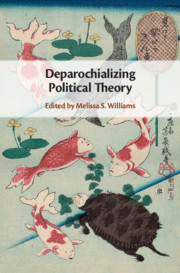Book contents
- Deparochializing Political Theory
- Deparochializing Political Theory
- Copyright page
- Dedication
- Contents
- Tables
- Contributors
- Preface and Acknowledgments
- Note on the Text
- 1 Introduction
- 2 Deparochializing Political Theory and Beyond
- 3 Recentering Political Theory, Revisited
- 4 A Decentralized Republic of Virtue
- 5 Deparochializing Political Theory from the Far Eastern Province
- 6 Is Popular Sovereignty a Useful Myth?
- 7 Authoritarian and Democratic Pathways to Meritocracy in China
- 8 Deparochializing Democratic Theory
- 9 Teaching Comparative Political Thought
- 10 Teaching Philosophy and Political Thought in Southeast Asia
- 11 Why Globalize the Curriculum?
- Index
7 - Authoritarian and Democratic Pathways to Meritocracy in China
Published online by Cambridge University Press: 15 March 2020
- Deparochializing Political Theory
- Deparochializing Political Theory
- Copyright page
- Dedication
- Contents
- Tables
- Contributors
- Preface and Acknowledgments
- Note on the Text
- 1 Introduction
- 2 Deparochializing Political Theory and Beyond
- 3 Recentering Political Theory, Revisited
- 4 A Decentralized Republic of Virtue
- 5 Deparochializing Political Theory from the Far Eastern Province
- 6 Is Popular Sovereignty a Useful Myth?
- 7 Authoritarian and Democratic Pathways to Meritocracy in China
- 8 Deparochializing Democratic Theory
- 9 Teaching Comparative Political Thought
- 10 Teaching Philosophy and Political Thought in Southeast Asia
- 11 Why Globalize the Curriculum?
- Index
Summary
In classical approaches to regime taxonomy, classifying a particular order within a typology of regimes turns on identifying the particular mix of its most important institutions and their associated purposes. Baogang He and Mark Warren’s past work has unsettled this familiar approach through a combination of innovative theorizing and empirical research. In this chapter, they extend their approach to recent arguments that Confucian ideals of meritocracy have been a significant factor driving China’s astonishing economic growth in recent decades. Beyond contesting the claim that China’s current regime is meritocratic, they reject altogether the view that “political meritocracy” is a regime type that can be coherently contrasted with “democracy.” Distinctions between regime types turn on how power is conferred on officeholders, whereas “meritocracy” refers to the qualities that officeholders possess. “Meritocracy” should be understood as an adjectival modifier of the two core regime types, authoritarianism and democracy. He and Warren draw on empirical research to argue that the current Chinese regime is a hybrid form, “authoritarian meritocracy with democratic characteristics,” that has emerged through innovative combinations of institutional forms. In practice, Chinese innovations sacrificed both democratic and meritocratic features of these institutions to the temptations of authoritarian rule.
Keywords
- Type
- Chapter
- Information
- Deparochializing Political Theory , pp. 174 - 200Publisher: Cambridge University PressPrint publication year: 2020
- 2
- Cited by



